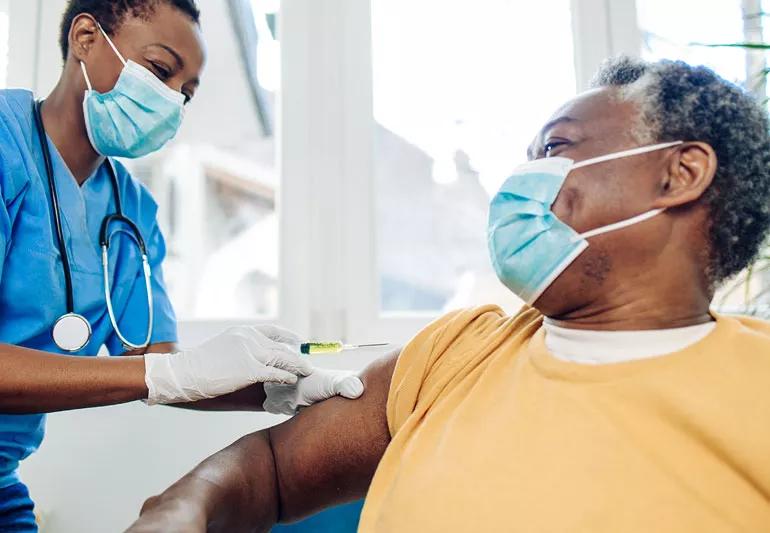Adults 60 or older, pregnant people and babies can get protected against the respiratory virus

Image content: This image is available to view online.
View image online (https://assets.clevelandclinic.org/transform/070fd9eb-bd8c-4221-83a1-292988619ed4/elderly-Person-gets-Vaccine-1303928581-770x533-1_jpg)
Elderly person receives vaccine in arm from health professional.
Respiratory syncytial virus, known as RSV, is a lung infection that’s highly contagious.
Advertisement
Cleveland Clinic is a non-profit academic medical center. Advertising on our site helps support our mission. We do not endorse non-Cleveland Clinic products or services. Policy
“RSV is the poster child for what’s called paramyxoviruses, which is a family of viruses that can cause mild infections,” says pediatric infectious disease specialist Frank Esper, MD. “But in certain individuals, it can cause more significant breathing problems and pneumonia.”
And while you may have thought that RSV is only prevalent in infants and children, anyone can get RSV.
So, is there a vaccine for RSV for adults?
Yes. While we’ve had vaccines for other viruses like COVID-19, the flu and chickenpox, the U.S. Food and Drug Administration (FDA) recently approved an RSV vaccine for adults. The same RSV vaccine can also be used for pregnant people, while an immunization that protects against RSV for babies is also available.
Dr. Esper explains what we know about the vaccines and who’s eligible to receive them.
Adults 60 years or older can receive the RSV vaccine as a single shot.
A trial of the vaccine showed it was 83% effective in preventing a lower respiratory tract disease, which includes having at least two symptoms — for example, a worsening cough, wheezing, shortness of breath — for a day. Additionally, the vaccine was 94% effective at preventing severe disease that could lead to needing supplemental oxygen or a ventilator.
Advertisement
Dr. Esper says it’s hard to determine how long the protection will last with a vaccine, but he does see the potential for an RSV vaccine to become part of our annual vaccination, like the flu vaccination.
“I don’t see an RSV vaccine giving lifelong immunity like the measles vaccine or the chickenpox vaccine does,” he continues. “I think it’s likely going to be one of those situations where if you want to have continued protection, you’re going to need to get boosters.”
Not all respiratory viruses are created equal, notes Dr. Esper.
“It’s like saying you have a vaccine that prevents against bear attacks. But will it also protect against shark attacks? The answer is ‘no.’ A bear and a shark are completely different animals,” he explains. “The same thing goes for RSV and the flu. They both cause pneumonia and respiratory disease, but they’re very different beasts.”
The flu vaccine is developed to target a specific strain of influenza, while the RSV vaccine is crafted to deal particularly with RSV.
“You’re not going to get one vaccine that cures all,” states Dr. Esper. “You’re going to need a COVID-19 vaccine. You’re going to need a flu vaccine. And eventually, you’re going to need an RSV vaccine.”
There’s been a lot of new information regarding RSV vaccines and who can get it. The RSV vaccine for adults is approved for people 60 years old or older.
Additionally, people who are pregnant can receive an RSV vaccine during week 32 and week 36 of pregnancy — and the vaccine will protect infants through the first six months of their life.
And babies up to 8 months old can get an RSV immunization (not a vaccine, but a dose of RSV protective antibodies) as they enter their first RSV season. A second dose may be recommended for toddlers before they enter their second RSV season if they have lung, heart or immune problems.
In addition to receiving the RSV vaccine if you qualify, there are things you can do to prevent the spread of this highly contagious virus.
These steps may seem familiar, as they’re also recommended in preventing the spread of COVID-19 and the flu:
Advertisement
“This virus loves to spread onto hands. And then, hands can move from person to person and place to place through contact,” says Dr. Esper. “So, washing your hands is one of the best things you could do.”
Advertisement

Sign up for our Health Essentials emails for expert guidance on nutrition, fitness, sleep, skin care and more.
Learn more about our editorial process.
Advertisement
It comes down to a wheeze, a fever and long-term effects
Babies should get the RSV immunization before their first cold and flu season
Taking extra precaution during RSV season can be lifesaving
Our most at-risk populations are still highly affected by RSV
RSV spreads easily and can infect anybody — not just children
People with certain pre-existing medical conditions have increased risk factors
TLC = keeping them home, letting them rest, managing their fever and maintaining their hydration
Changes to the virus cycle put more importance on taking proper precautions
Type 2 diabetes isn’t inevitable with these dietary changes
Applying a hot or cold compress can help with pain
Pump up your iron intake with foods like tuna, tofu and turkey